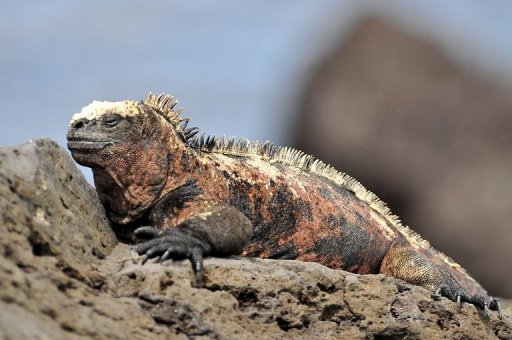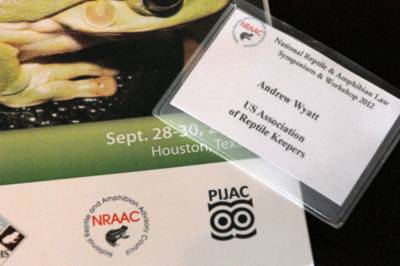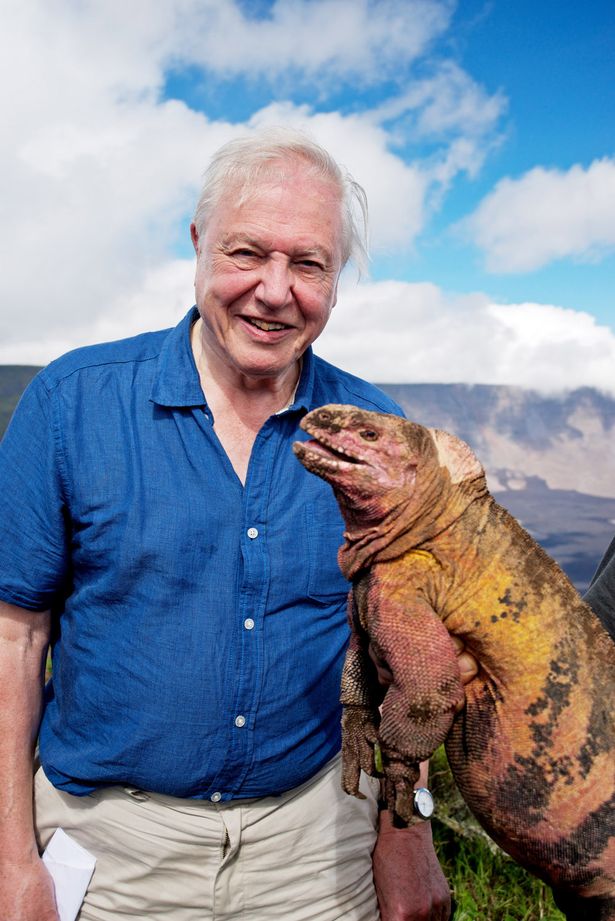Reptile & Amphibian
News Blog
Keep up with news and features of interest to the reptile and amphibian community on the kingsnake.com blog. We cover breaking stories from the mainstream and scientific media, user-submitted photos and videos, and feature articles and photos by Jeff Barringer, Richard Bartlett, and other herpetologists and herpetoculturists.
Wednesday, January 9 2013
 An Ecuadoran court has convicted a German man of trying to smuggle four threatened iguanas out of the Galapagos Islands.
From Phys.Org:
Dirk Bender was convicted "of having altered the local ecosystem of the archipelago," park authorities said.
The Galapagos National Park has requested the maximum four-year jail term for Bender, who should be sentenced in the coming days.
Bender was arrested at the airport on Baltra Island on July 8 after park officials noticed him carrying a suspicious package, which was found to contain four lizards wrapped in canvas.
The hidden reptiles were Galapagos Land Iguanas (conolophus subcristatus), which the International Union for Conservation of Nature ranks as "vulnerable" on its Red List of Threatened Species.
Read the whole story here.
Monday, January 7 2013
 In the business world, CEOs and presidents are fired, resign, or move on to other things every day. Sometimes they resign to move on to bigger and better things. Sometimes they resign because of a difference of opinion with their board. Sometimes they resign in lieu of being terminated, sometimes because the board has lost faith, sometimes because of gross incompetence or dishonesty, and sometimes because criminal activity has been uncovered. It's tough to read between the lines in press releases, but in the business world if an executive move is lateral or downward, you can usually bet the resignation wasn't by choice.
Sometimes these management changes signal a change for the worse in an organization, and sometimes it's a change for the better. Rarely does it signal impending doom -- it's far more likely it simply signals a change in direction. In the case at hand, the changes are for the good, and signal a change in direction: the right direction.
I'm talking about the recent resignation of USARK's Andrew Wyatt. Since USARK's inception, I have withheld support of the organization out of concern over the individual at its helm. Some believed it was, and Wyatt himself always passed it off as, personal animosity, but that's not the case.
Having already started and been involved with a similar lobbying organization in the years from 1997-2002, I was familiar with the problems and obstacles such an organization faced, and therefore did my best to steer everyone toward using assets already in place rather than creating the expense, burden, commitment, and risk a new organization would entail.
I also knew that, once started, it would forever need to be fed, in ever-growing amounts of money. I knew such an organization would need to be geared up to operate for 20+ years, and raise millions of dollars. And I knew that the easiest, fastest way to raise early money was to start yelling "fire" all the time -- a battle cry that would inevitably backfire and be destructive to our community and our hobby.
Which is exactly what we saw happen with the constant drumbeat of disaster Wyatt put forth from USARK during his tenure. And just as I feared, it frightened away consumers and businesses, putting downward pressure on an industry and hobby already staggering under the weight of a bad economy.
I also kept my distance from Wyatt's organization because it didn't pass my due diligence.
Websters defines "due diligence" two ways: First, as the care that a reasonable person exercises to avoid harm to other persons or their property, and second, as the research and analysis of a company or organization done in preparation for a business transaction.
As part of that process, I looked at everything I could find pertaining to the organization and the individual running it. Neither the strategy being employed, nor the lack of transparency, nor the possibility of harm, gave me confidence in either.
I was also concerned about the structure of USARK, which left all the power concentrated in the hands of one individual, the founder, with a board of directors limited in its ability to assert control should he choose to take the organization down a wrong path.
Even more troubling to me, that individual had no legal background, no lobbying background, and no corporate background. In fact, as far as I could tell, his knowledge of and background in the herp community and industry was limited. I knew that there would be hundreds of thousand of dollars required to do what he was proposing, and at risk would be an industry with thousands of businesses and individuals involved, worth millions. Despite this, it seemed that something as basic as a relevant background investigation had never even been run.
Finally, I knew that as long as Wyatt was in charge, it would be his organization, not the board's, and certainly not the "Reptile Nation's."
So I withheld kingsnake.com's support, and my support, until Wyatt and USARK could prove themselves.
In the following years, Wyatt, did nothing to prove me wrong. In fact, it almost seemed that he did everything to prove me correct, repeatedly. Evidence and allegations of bad management were rife, including loose controls over cash flow and expenses, excessive travel for limited gain, lack of transparency as to how funds were spent, poor messaging and messaging protocols, and USARK officers carrying on inappropriate personal relationships with USARK volunteers at industry trade show events.
As USARK gained momentum and voice, Andrews' "house on fire" tactics took a greater and greater toll on hobbyists and businesses, turning what had been a rapidly-growing industry into one that slowed, then stopped, then began to reverse course.
I repeatedly raised numerous questions and concerns to Andrew, to the USARK board members, and to the community. I pointed out that the path we were headed down was damaging us as an industry and community. Wyatt continued to paint this as a personal issue, and publicly labeled me as "divisive" every chance he got.
Perhaps for that reason, the USARK board disregarded my questions and warnings, and I never got the information and answers I was looking for. My opposition to USARK's leadership, policies, and direction became well known not only in the back channels where I tried to keep them, but publicly as well -- so well-known, in fact, it negatively impacted my business, my friendships, and my personal relationships in the community.
In the spring of 2012, feeling almost desperate about the direction our hobby was moving in and hoping to rebuild some of the bridges Wyatt was burning, I helped start a reptile law education organization dedicated to putting on a reptile law symposium, the re-purposed National Reptile and Amphibian Advisory Council (NRAAC).
NRAAC was indirectly threatened with, and ultimately suffered, a "blackout" by industry leaders and media connected to the USARK organization. Others in the community were pressured by USARK, both directly and indirectly, not to participate in the organization or the symposium. Virtually the only press we got was on kingsnake.com. I was even told, by one long-time customer, that he could not accept my event's advertising, free or paid, for fear of upsetting USARK.
The blackout dramatically impacted our ability to market the event and directly limited the participation by the community in the very first national reptile law symposium. Were it not for the federal and state agencies, as well as PIJAC, the ARAV, and especially the ETHS, the event would have foundered. Thanks to them, it was a huge success.
I'd like to address another issue that demonstrates how Wyatt put his own personal agenda ahead of the well-being of our hobby. Wyatt and another USARK officer, Ericka Walsh, claimed that they were unaware of the Symposium until it was too late to attend, and that they were not invited to participate. This is demonstrably untrue. We invited USARK directly via email from our site coordinator. Despite the lack of response to our invitation, we even had a badge prepared and waiting for Wyatt at the event, should he have decided to appear at the last moment.
But Wyatt didn't appear. Nor did Walsh.
Neither did Dave and Tracy Barker, who were also invited to represent either USARK or their own business, or both, despite Dave being invited by me personally during the Snake Days event in Sanderson four months previously, and receiving multiple email invites. Wyatt, Walsh, the Barkers -- not one of them could see the need to sit down and talk with the specific federal agencies, and the specific individuals within those agencies, tasked with deciding the fate of Boa Constrictors and Reticulated Pythons.
Fortunately, less than a week before the event, Gary and Shane Bagnall made arrangements to participate, guaranteeing USARK at least some representation.
So here we are today.
Andrew has "resigned" under what most people see as the proverbial "mysterious circumstances." He is predictably painting himself as the martyr in the situation, and is trying to divide the community by launching an organization directly competing with USARK. He is using what is essentially a generic cover story to explain his exit, and to justify the need for the existence of this new organization, to launch it, and to once again ask you for your money. And he is hiding the facts behind a non-disclosure agreement that masks the real circumstances of his exit. Talk about being "divisive."
Maybe you're considering supporting Wyatt's new organization. Maybe you believe his claims that only he, not USARK and its board, nor anyone else in the herp community, really cares about your interests. Maybe you just don't want to make him into an enemy.
Fine. But before you support any organization headed by Andrew Wyatt, you should ask him the questions I'd like to have asked him over the last three years (and tried to). Under oath.
Here are five questions for Andrew Wyatt, below the jump -- add yours in the comments!
Continue reading "The exit of Andrew Wyatt"
Sunday, January 6 2013
Check out this 2010 Two-Headed Bearded Dragon video submitted by kingsnake.com user RoachMei.
Submit your own reptile & amphibian videos at http://www.kingsnake.com/video/ and you could see them featured here or check out all the videos submitted by other users!
Friday, January 4 2013
 As expected and predicted, HR 511 expired when the House adjourned, once more "saving" boas and pythons from the clutches of federal legislators just in the nick of time. Before we go around patting ourselves on the back, shooting off fireworks, and waving victory flags, consider this.
Logistically, HR 511 and all its predecessors never had a chance of passing, regardless of what either side said or how either side spun it.
Without question, based on the laws of statistics alone, the same or a similar bill will reappear again in 2013 or 2014 under a new HB or SB number, and it, too, will die a long, slow, tortuous death -- but not until after all the lobbyists on both sides spend months making speeches, giving interviews, asking for money, soliciting support, and claiming victory. And then it will happen again in 2015, 2016, 2017...
Beginning to see a pattern here?
There has never, ever, been a House Bill or Senate Bill specifically regarding any reptiles or amphibians that has ever -- ever -- been signed into law by a President. And odds are, there never will be. Statistically. Realistically. The path for most federal legislation is long, fraught with blind turns, and usually reaches a dead end. It's even more so for herp-related issues. For it to actually happen is almost a mathematical impossibility at this point.
Does this mean boas and pythons are safe? No. The remainder of the "Big Nine," the ones that the Fish and Wildlife Service didn't ban last January, are in still in limbo at the federal level. And they can be banned any moment, at the stroke of a pen, without hearings, requests for comment, or a chance to write letters to senators. All that is left is the decision.
And at the state level, things change all the time, and boas, pythons, and many other species are constantly at risk.
There is still so much work to be done, and there are still bridges to be built (and some that need to be re-built). We have to work smarter, not harder, and we need to continue to work toward resolving our issues with the agencies involved.
We need to stop scaring everyone with threats that may never actually materialize, and focus on the threats that are real, and deal with them with a much more reasoned, effective response. And we need to stop running the flag up the pole every time someone introduces this bill, or that resolution, and calling out the militia and scaring away hobbyists and businesses.
As a community, we have worked a long and hard road to build systems to respond to and manage these threats. Along the way we have done many things right, and we have done many things wrong. But while I know there's no doubt the threat to our hobby and our community is real, there's also no doubt that, given a reasoned, effective, organized response, it's also very manageable.
 In his new series on the Galapagos, Sir David Attenborough has captured a rare pink iguana on film for the first time. “It’s a remarkable thing in this day and age when you think about the number of scientists per square metre in the Galapagos, and yet suddenly we have discovered a new species,” Sir David said. Read more...
In New York, the Bronx Zoo welcomed five Chinese yellow-headed box turtles as part of a part of a Wildlife Conservation Society effort to save endangered turtle species. Caution: Cute alert. Read more...
Biologist Michel Garey discovered a new species of tiny, three-fingered frogs, back in 2007, and last summer, the little critters got a name: Brachycephalus tridactylus. The story of the frog species' discovery was published in Herpetologica, a journal about the study and conservation of reptiles and amphibians. Read more...
Thursday, January 3 2013
 You might have heard the story on NPR, or seen it come across the wires or your Google alerts: A North Carolina man was arrested, charged with felony animal cruelty, and held on a $20,000 bond for allegedly shooting his pet python.
It's not at all clear what happened -- initial reports didn't include the shooter's side of the story, and he's now claiming the snake, named "Anonymous," was a beloved pet who was already dead when he shot him. From the Charlotte Observer:
“I couldn’t bury him or the other animals would get him,” Ericcson told NBC Charlotte, the Observer’s news partner. “I had to shoot it to get the gas out of him, then I was going to burn him.”
Ericcson said the snake was his pet for about 17 years. “I’ve had that snake since he was so small he could just wrap around your wrist,” he said. “Me and my wife can’t have kids, so the animals are our kids.”
Ericcson claimed he was so distraught over the snake’s death, he shot up the large cabinet that contained his Dale Earnhardt collection.
Setting aside the made-for-reality-TV elements of the story, the extraneous details, and the conflicting news accounts, focus on just one thing: In North Carolina, the media is uniformally referring to a python as a "pet," and authorities charged someone who allegedly shot a python with felony animal cruelty.
In Florida, they're paying bounty on killed pythons. In North Carolina, they're protected pets. Go figure.
H/T to Alex Scharnberg for the tip.
Wednesday, January 2 2013
 The United States Association of Reptile Keepers (USARK) has issued a formal statement on the future of their organization and the recent resignation of its CEO and president (also available in PDF):
USARK announces that Andrew Wyatt has tendered his resignation as CEO and president of USARK, the organization that he co-founded in 2008, due to philosophical differences and in order to pursue other interests, effective December 31, 2012. USARK wishes Wyatt well on his future endeavors and Wyatt wishes nothing but the best for the reptile industry.
USARK is the largest, and most well-funded, pro reptile-keeping organization in the history of US herpetoculture. Going forward, USARK has an aggressive game plan for 2013 which includes:
1) Defending against federal legislative and requlatory restrictions: In 2011-2012, USARK successfully blocked HR 511 which would have prohibited the import and interstate transport of nine constrictor species. USARK remains committed to defeating any and all similar legislation in the new Congress which convenes this week in Washington and to keeping up the pressure on the USFWS to prevent the addition of additional species as injurious under the Lacey Act. To advance this goal, USARK is compiling an up to date inventory and analysis of all new studies and related publications rebutting the USGS findings that have been published since the public comment period on the rule ended. Additionally, USARK will work diligently to put USFWS on notice that no final rule should be made without the opportunity to submit new information for the record, and for consideration for any future rulemaking on this issue. New research that has come to light undermines the current justification for ruling in favor of banning constrictor species.
2) State legislation & USARK - Mobilizing the Grass Roots: USARK is committed to working at the grassroots level to ensure that our voices are heard By Reaching out to major herp stakeholders (reptile breeders) in each state and setting up USARK Stakeholder Ambassadors to help fight anti-herp legislation in locally, we can make a difference. USARK will offer expertise and support in fighting anti-herpetoculture legislation, in addition to offering the services of a lobbyist to help in the fight at the state level.
3) CITES and the United States Endangered Species Act: Currently, US taxpayers are paying to fund studies of non-native species that are listed on the US Endangered Species Act. There are just over 2000 total species listed under the US Endangered Species Act, of which over 600 species are foreign and are not native to the USA. These species are already protected through CITES (Convention on International Trade in Endangered Species) of which the USA is a member. There is no need to further protect foreign species by listing them under the US Endangered Species Act, which restricts ownership, prevents establishment of assurance colonies, and prevents US breeders from moving these animals across state lines or exporting them out of the USA (including export back to their range country).
4) USARK & NRAAC: This past year, the NRAAC put on the first annual Reptile and Amphibian Law Symposium & Workshop which was cohosted by PIJAC, the ARAV (Association of Reptilian & Amphibian Veterinarians), and the East Texas Herp Society. This event brought together major stakeholders from industry with lawmakers and government officials that play a key role in herp-related legislation. The NRAAC has proven to be an important resource for news, education, and serves as a vehicle to bring together people and organizations to discuss important issues. USARK’s president of the Board, Gary Bagnall, attended the 2012 symposium. USARK fully supports the efforts of the NRAAC and is looking forward to working closely with the NRAAC in 2013.
5) USARK & PIJAC: USARK is committed to working closely with PIJAC (Pet Industry Joint Advisory Council) on the issue of the release/escape of non-native species in the US. This is an extremely important issue for the reptile industry and for USARK stakeholders. PIJAC has a 10 year head start on this issue and USARK needs to partner with them and report back to you, our esteemed membership.
6) EDUCATION: Produce a series of educational videos starting with the proper husbandry and handling of large constrictors. We need to be proactive in this area to show that we are a responsible industry.
USARK BUDGET: Last year USARK brought in $300,000 of which 35% went to our lobbyist in Washington DC, 30% went to the former president’s salary, and 30% funded operating expenses (travel, hotel, t-shirt printing, etc.). In order to operate effectively, we need to raise $500,000 annually which will allow USARK to hire a full-time office administrator, fund important scientific studies, and pay expensive legal fees in the fight against anti-herp legislation.
WE NEED YOUR SUPPORT! If you have not renewed your membership, please visit the USARK website and do it now. You are a stakeholder and each member is very important to USARK. It is your membership that enables USARK to protect our rights to keep reptiles and amphibians in captivity! Your support of just $5 a month can make a BIG difference!
BREEDERS, PROFESSIONALS & MAJOR STAKEHOLDERS (you know who you are): USARK has a new membership category called “USARK Platinum Member”. If you pledge $1000 per month to USARK for 12 consecutive months, you will enjoy the following privileges:
• A seat on the USARK executive platinum committee.
• A USARK Platinum Member plaque to hang in your home or business.
• A USARK Platinum Member banner to put on your website.
• T-shirts for your entire staff (up to 20 shirts).
• An invitation to our annual USARK executive committee dinner for up to 4 people in your organization.
The organization can be contacted at this link.
 Ever wanted to use kingsnake.com on your smartphone? Now you can.
Today, kingsnake.com launched a fully-featured mobile site, including the classified ad system, the site's most-trafficked destination, as well as its popular locators for zoos and herp-related events, veterinary services, breeders, supplies and services, and rescue groups.
Mobile users can view and post classifieds both locally and nationally, including uploading photos. They can also search for reptile breeders and businesses, find a local pet store, check reptile and amphibian laws, and more. With After Dark mobile, they can even find that special herp-friendly "someone," desktop-free.
Located at http://mobile.kingsnake.com, the site is designed specifically for smart phones that are touch-screen enabled. While still considered a beta release, the mobile site has been tested on a variety of a variety of iPhones, Androids and Blackberrys, and several different mobile OS and browsers.
Although primarily designed for smartphones, the site is also tablet-compatible.
kingsnake mobile is just the first of a number of cool projects in the pipeline, so stay tuned for more development news from kingsnake.com in the New Year.
Tuesday, January 1 2013
 United States Association of Reptile Keepers (USARK) President Andrew Wyatt announced his resignation from the organization yesterday, leaving many in the reptile world to wonder what will happen with the current organization and its assets.
Board members are preparing a statement and are not ready to comment officially yet, but did confirm to kingsnake.com that the USARK organization will continue to operate under the direction of the board until such time as a suitable professional candidate has been found. The board is currently reviewing a number of prospective candidates and say they hope to come to a decision soon, and that USARK will continue to move forward in representing its members interests in 2013.
USARK's board currently consists of members of some of the oldest and largest businesses in the reptile community, including Zoomed, Timberline, and LLL Reptile.
kingsnake.com has offered support and assistance to the USARK board in helping it reach its goals in 2013. We hope the changes brought about by the leadership transition will signal a fresh new start for the organization and the community.
Additionally, the National Reptile and Advisory Council has extended an invitation to USARK to co-host the 2013 Reptile & Amphibian Law Symposium in Washington D.C., alongside the other confirmed hosts, which so far include the Association of Reptilian and Amphibian Veterinarians (ARAV) and the Pet Industry Joint Advisory Council (PIJAC).
Best of luck to USARK as it begins a new year.
|






